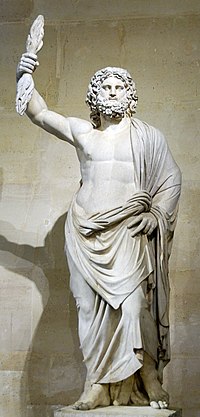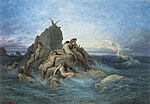Hesiod (/ˈhiːsiəd/ HEE-see-əd or /ˈhɛsiəd/ HEH-see-əd; Ancient Greek: Ἡσίοδος Hēsíodos; fl. c. 700 BC) was an ancient Greek poet generally thought to have...
47 KB (6,009 words) - 21:13, 16 December 2024
Titans (section Hesiod's genealogy)
Τιτάν, Titán) were the pre-Olympian gods. According to the Theogony of Hesiod, they were the twelve children of the primordial parents Uranus (Sky) and...
85 KB (9,257 words) - 02:15, 31 December 2024
Hesiod, Theogony 921. Hard 2004, p. 78; Hesiod, Theogony 912–920; Morford, p. 211. Hard 2004, p. 80; Hesiod, Theogony 938. Hard 2004, p. 77; Hesiod,...
202 KB (17,297 words) - 11:20, 2 January 2025
personification of the sky and one of the Greek primordial deities. According to Hesiod, Uranus was the son and husband of Gaia (Earth), with whom he fathered the...
41 KB (4,143 words) - 09:14, 2 January 2025
Pontus (mythology) (section Hesiod)
to the Greek poet Hesiod, he was born without coupling, though according to Hyginus, Pontus is the son of Aether and Gaia. For Hesiod, Pontus seems little...
6 KB (603 words) - 09:45, 3 December 2024
Greek mythology connected with the myth of Pandora in Hesiod's c. 700 B.C. poem Works and Days. Hesiod related that curiosity led her to open a container...
37 KB (4,777 words) - 08:03, 18 December 2024
Theogony (redirect from Hesiod's Theogony)
Θεογονία, Theogonía, i.e. "the genealogy or birth of the gods") is a poem by Hesiod (8th–7th century BC) describing the origins and genealogies of the Greek...
70 KB (5,945 words) - 16:02, 28 November 2024
Iliad (where she is the "sister" of Ares the god of war). According to Hesiod she was the daughter of primordial Nyx (Night), and the mother of a long...
52 KB (4,671 words) - 02:47, 27 December 2024
Union (IAU) in 1976. Hesiod is named for the Ancient Greek poet Hesiod, who lived around 800 BCE. Kuniyoshi crater is west of Hesiod, and Pampu Facula is...
1 KB (84 words) - 16:25, 27 August 2024
unnamed, but Hyginus wrote that it was Pleione, mother of the Pleiades. Hesiod, and the Homeric Hymn to Demeter, mention either a different Calypso or...
19 KB (1,798 words) - 18:55, 1 December 2024
unrealisable, wild, foolish or vain dream, notion or objective. According to Hesiod, the Chimera's mother was a certain ambiguous "she", which may refer to...
22 KB (2,295 words) - 07:16, 19 December 2024
a remark made in Hesiod's Works and Days to construct an imagined poetical agon between Homer and Hesiod. In Works and Days, Hesiod (without mentioning...
9 KB (1,211 words) - 17:07, 28 November 2024
(21 pages) M. L. West commentaries on Hesiod, W.J. Verdenius commentaries on Hesiod, and R. Lamberton's Hesiod, pp. 95–100. Casanova, Angelo (1979). La...
86 KB (10,440 words) - 09:08, 2 January 2025
(Βριάρεως) was probably formed from the Greek βριαρός meaning "strong". Hesiod's Theogony also calls him "Obriareus". The name Gyges is possibly related...
82 KB (9,058 words) - 13:40, 31 December 2024
Golden Age (redirect from Golden age (Hesiod))
Golden Age comes from Greek mythology, particularly the Works and Days of Hesiod, and is part of the description of temporal decline of the state of peoples...
27 KB (3,597 words) - 08:15, 20 December 2024
7 (citing "Hesiod" = Hesiod Catalogue of Women fr. 137a Most) and Scholia on Tzetzes' Exegesis in Iliadem 1.122 (citing "Hesiod" = Hesiod Catalogue of...
27 KB (2,817 words) - 17:29, 5 December 2024
was the eldest of the Titan offspring of Uranus (Sky) and Gaia (Earth). Hesiod lists his Titan siblings as Coeus, Crius, Hyperion, Iapetus, Theia, Rhea...
59 KB (4,999 words) - 09:09, 2 January 2025
always." According to Hesiod, Styx lived at the entrance to Hades, in a cave "propped up to heaven all round with silver pillars". Hesiod also tells us that...
46 KB (4,585 words) - 09:08, 2 January 2025
According to Hesiod's Theogony (seventh century BC), they were daughters of Zeus, king of the gods, and Mnemosyne, Titan goddess of memory. Hesiod in Theogony...
38 KB (3,473 words) - 08:38, 21 December 2024
(Hercules in Roman mythology) and Perseus. According to the ancient Greek poet Hesiod, Atlas stood at the ends of the earth in the extreme west. Later, he became...
34 KB (3,199 words) - 21:24, 31 December 2024
with the chaos serpent Apophis. Hesiod and the Pre-Socratics use the Greek term in the context of cosmogony. Hesiod's Chaos has been interpreted as either...
35 KB (4,077 words) - 03:11, 9 December 2024
7 (citing "Hesiod" = Hesiod Catalogue of Women fr. 137a Most) and Scholia on Tzetzes' Exegesis in Iliadem 1.122 (citing "Hesiod" = Hesiod Catalogue of...
44 KB (4,540 words) - 06:11, 22 December 2024
List of Greek mythological figures List of Greek mythological creatures Hesiod’s Theogony There are conflicting stories regarding the origins of Eros. Eros...
10 KB (315 words) - 05:26, 15 December 2024
antiquity with the Roman deity Saturn. In an ancient myth recorded by Hesiod's Theogony, Cronus envied the power of his father, Uranus, the ruler of the...
48 KB (5,182 words) - 18:21, 17 December 2024
Pegasus was at Troezen. Hesiod relates how Pegasus was peacefully drinking from a spring when the hero Bellerophon captured him. Hesiod wrote that Pegasus...
17 KB (1,807 words) - 16:01, 28 November 2024
characteristics; they were instead personifications of places or abstract concepts. Hesiod, in his Theogony, considers the first beings (after Chaos) to be Erebus...
22 KB (2,346 words) - 05:14, 17 December 2024
Oceanid nymphs were associated with water, as the personification of springs. Hesiod says they are "dispersed far and wide" and everywhere "serve the earth and...
20 KB (2,038 words) - 05:36, 11 November 2024



























